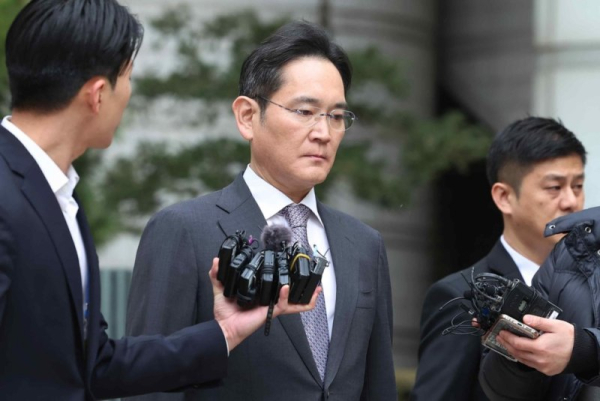

South Korea’s Supreme Court upheld a lower court’s acquittal of Samsung Electronics Chairman Lee Jae-yong (C) of fraud charges on Thursday. The decision ends years of legal disputes for Lee, seen here leaving a Seoul district court in 2024. Photo by Yonhap/EPA-EFE
South Korea’s Supreme Court on Thursday upheld the acquittal of Samsung Electronics Chairman Lee Jae-yong on fraud charges related to a 2015 merger, lifting a legal cloud that had hung over the country’s richest man for years.
The top court said it found no errors in the ruling by the Seoul High Court in February, which acquitted Lee of charges of stock manipulation and accounting fraud in a controversial $8 billion deal involving two of the company’s affiliates.
That merger, between Cheil Industries and Samsung C&T Corp., helped solidify Lee’s control of the company after his father, then-Chairman Lee Kun-hee, suffered a heart attack in 2014. Prosecutors alleged that Lee and other Samsung officials engineered a favorable merger ratio by artificially inflating Cheil’s value and depreciating Samsung C&T, harming minority shareholders in the process.
A lower court last year also cleared Lee of the charges. Thursday’s ruling by the Supreme Court cannot be appealed, ending a legal battle that has gone on since Lee was first indicted on the fraud charges nearly five years ago.
Lee’s legal team said the ruling “clearly confirmed” that the merger was legitimate.
“We sincerely thank the court for its wise judgment after five years of faithful deliberations,” the lawyers said in a statement.
Lee served roughly 18 months in prison after being convicted in a separate 2017 bribery case involving former South Korean President Park Geun-hye.
The legal drama has added to Samsung’s challenges as it navigates intense competition in key industries such as smartphones and semiconductors.
Last week, the tech giant announced a 56% decline in operating profits for the second quarter of the year, citing factors such as the impact of U.S. semiconductor export restrictions to China. South Korea is also facing U.S. President Donald Trump’s pending 25% tariffs, currently scheduled to go into effect on Aug. 1.
The country’s business community welcomed news of the acquittal Thursday, predicting it would give a boost to the country’s largest conglomerate.
“In an era of fierce global competition in cutting-edge industries, the removal of legal uncertainties surrounding a key company like Samsung is expected to have a positive ripple effect not only on the firm but on the Korean economy as a whole,” Kang Seok-koo, head of the research division at the Korea Chamber of Commerce and Industries, said in a statement.
Civic groups, however, criticized the Supreme Court ruling as biased in favor of the massive chaebol, or conglomerates, that have long dominated South Korea.
“The result of this trial is that the court has once again made a pro-chaebol ruling with a passive and narrow interpretation of the law,” People’s Solidarity for Participatory Democracy said in a statement. “We strongly condemn the judiciary for making a shameful decision that undermines social justice by acting as a shield for corporate power.”